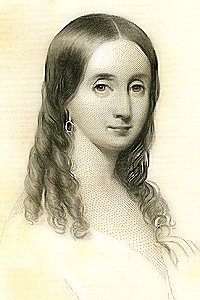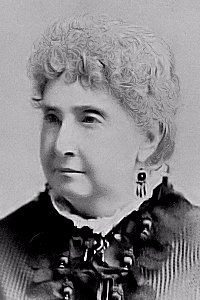Introduction

Born: December 18, 1810, New York City.
Died: November 19, 1889, Summit, New Jersey.
Buried: Woodlawn Cemetery, Bronx, New York.


Born: December 18, 1810, New York City.
Died: November 19, 1889, Summit, New Jersey.
Buried: Woodlawn Cemetery, Bronx, New York.

Elizabeth was the daughter of David Low Dodge and Sarah Cleveland, and granddaughter of colonial poet Aaron Cleveland.
Her first husband was Edmund Burke Stedman (1799–1835, married 1830). After he died, leaving her with a child, she began contributing to magazines such as Graham’s, Sartain’s, and the Knickerbocker.
In 1841, she married William Augustus Burnet Kinney of New Jersey (1799–1880), editor of The Newark Daily Advertiser.
In 1850, William was assigned to Sardinia, and for four years the Kinneys lived in Turin, Italy. When William’s posting ended, they moved to Florence, where the literati included Robert and Elizabeth Barrett Browning, Alfred Tennyson, and Anthony Trollope. Elizabeth wrote her metrical Italian romance Felicità while they were in Florence.
The Kinneys returned to Newark, New Jersey, in 1865.
Peace brooded o’er earth; in the distance afar
Had died the harsh echo of clangorous war;
The heart of the nations from tumult reposed,
The long opened temple of Janus was closed.
Night’s canopy over Judea now hung:
The harp of the minstrel lay still and unstrung;
The shepherds together sat watching the fold,
While round them reigned darkness, and silence, and cold.
But whence came that shaft, than a day-beam more bright,
Shot suddenly through the still heart of the night?
What melody startles her silent domain,
Pale winter stars waking from mountain to plain?
The pale winter stars are extinguished as one,
Yet light that conceals them is not like the sun;
It moves with the swiftness of wings, it descends,
Its luminous track the strange music attends!
But cold as the night air of Israel’s plains
The blood of the shepherds congeals in their veins;
They speak not, but heart unto heart beats aloud,
While glory envelopes them all as a cloud.
And now, in their midst, shines an angel of light—
Quick vanishes fear at the radiant sight!
And hark, in the words of their own native tongue,
Good tidings of joy
by the angel are sung!
This day, in the city of David is born
A Savior, whose birth is Redemption’s glad morn;
No longer through darkness and doubt shall ye grope,
In Bethlehem’s manger lies Israel’s Hope!
A chorus angelic re-echoes in Heav’n
The glorious news to the meek shepherds giv’n—
Peace, peace and good will unto earth!
is their song,
While praises to God the long pæn prolong.
’Tis gone, the bright vision—its music hath ceased!
But lo, there arises a star in the east;
O’er manger it stands in its glory alone—
The despot beholds it, while trembles his throne.
Oh, awful to him is the radiance mild
That circles the brow of the heavenly Child!
That cradle where innocence sleeps is his dread,
And guilt feels the doom that hangs over his head.
But joy to the watchers of Zion! that star,
Predicted and seen by the prophets afar,
Now points with its beams to the place of His birth
Whose kingdom shall rule all the kingdoms of earth.
Adapted from Elizabeth Clementine Kinney
Poems, 1867, pp. 78–80